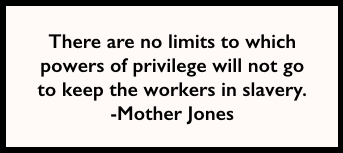 ———-
———-
Hellraisers Journal – Friday June 30, 1899
Edward H. Hamilton Reports from the Coeur d’Alene Country, Parts III & IV of IV
From the San Francisco Examiner of June 28 & 29, 1899:
 ———-
———-
Hellraisers Journal – Friday June 30, 1899
Edward H. Hamilton Reports from the Coeur d’Alene Country, Parts III & IV of IV
From the San Francisco Examiner of June 28 & 29, 1899:
 ———-
———-
Hellraisers Journal – Thursday June 29, 1899
Edward H. Hamilton Reports from the Coeur d’Alene Country, Part II of IV
From the San Francisco Examiner of June 27, 1899:
Note: Sadly, it was thought necessary by The Examiner to specify that the soldiers committing acts of terror against the miners in the bullpen are “Blacks” or “Negro troopers,” but whenever white soldiers and/or deputized company gunthugs commit acts of terror against strikers, the race of those perpetrators of despotism is never mentioned.
—–
 ———-
———-
Hellraisers Journal – Wednesday June 28, 1899
Edward H. Hamilton Reports from the Coeur d’Alene Country, Part I of IV
From the San Francisco Examiner of June 26, 1899:
—–
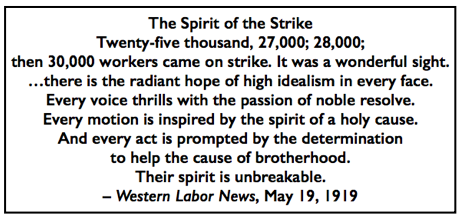 ———-
———-
Hellraisers Journal – Friday June 27, 1919
Winnipeg, Manitoba – General Strike Called Off
From The Butte Daily Bulletin of June 25, 1919:
WINNIPEG STRIKE ENDS
—–
Strike Committee After All Night Session Decides
to Let Government Commission Investigate.
—–
(Special to The Bulletin.)
Winnipeg. June 25.-The general strike which has lasted more than 40 days, will end Thursday at 11 o’clock. This announcement was made after an all-night session of the general strike committee. Sympathetic strikes in other cities will end at the same hour.
The decision of the strike committee, which ends a struggle that will have been exactly six weeks in effect at 11 o’clock Thursday, follows a conference of the delegates of the strike committee with Premier Norris and members of the provincial government yesterday.
The men forward the proposition that if the government would appoint a commission to investigate the strike and settle all disputes they would call off the general strike. The reply of the government was that the general strike must be called off first.
If that were done, then a commission, headed by H. A. Robertson [Hugh Amos Robson], would be appointed. It has been intimated that it had been the intention of the government for some weeks to appoint a commission, but action by the strike committee was awaited in regard to calling off the strike.
———-
[Newsclip added from Winnipeg Evening Tribune of June 26, 1919. Emphasis added.]

———-
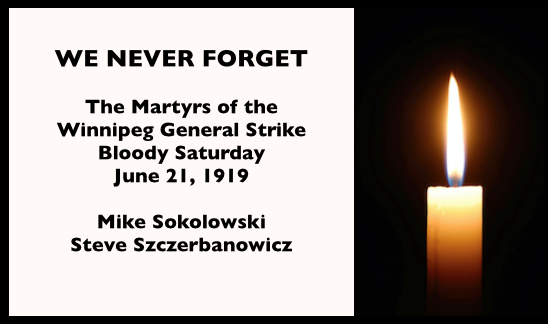
———-
Blooday Saturday
The Western Labor News, Special Strike Edition No. 32, of June 23, 1919 described events of Saturday, June 21st:One is dead and a number injured, probably thirty or more, as result of the forcible prevention of the “silent parade” which had been planned by returned men to start at 2.30 o’clock last Saturday afternoon…..
On Saturday, about 2.30 p.m., just the time when the parade was scheduled to start, some 50 mounted men swinging baseball bats rode down Main Street. Half were red-coated R.N.W.M.P., the others wore khaki. They quickened pace as they passed the Union Bank. The crowd opened, let them through and closed in behind them. They turned and charged through the crowd again, greeted by hisses, boos, and some stones. There were two riderless horses with the squad when it emerged and galloped up Main Street. The men in khaki disappeared at this juncture, but the red-coats reined their horses and reformed opposite the old post office.
Shooting to Kill
Then, with revolvers drawn, they galloped down Main Street, turned, and charged right into the crowd on William Avenue, firing as they charged. One man, standing on the sidewalk, thought the mounties were firing blank cartridges until a spectator standing beside him dropped with a bullet through his breast. Another standing nearby was shot through the head. We have no exact information about the total number of casualties, but there were not less than thirty. The crowd dispersed as quickly as possible when the shooting began.
From “Winipeg General Strike…Two Ukrainians Killed”
-by Peter J. Manastyrsky:
Mike Sokolowski (AKA: Sokolowiski) was killed in front of City Hall on what came to be known as Bloody Saturday, shot by the Royal Canadian Northwest Mounted Police during the fighting. Sokolowski was the only person killed in the riot and buried at Winnipeg’s Brookside Cemetery (section 45, plot 450). Mike Sokolowski’s grave was unmarked for over 80 years until June 20, 2003. As part of the Brookside Cemetery’s 125th Anniversary, a donation was made to purchase a headstone for Mike Sokolowski.
On the other hand, Steve Szczerbanowicz (AKA: Sheebaubucz, Schezerbanowicz, Schezerbanowes) after being shot through both legs by a police officer during the Winnipeg General Strike on June 23rd, died due to a gangrene infection. For 96 years Steve Szczerbanowicz was buried at an unmarked grave at Brookside Cemetery but on June 20th, 2015 funds were raised to cover the cost of a gravestone in memory of Steve Szczerbanowicz (section 80, plot 7) victim of the six-week Winnipeg General Strike.
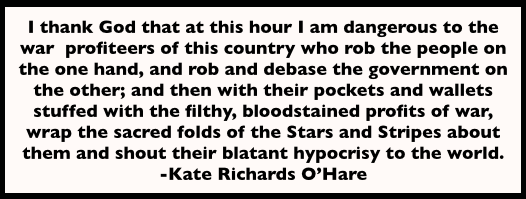 ———-
———-
Hellraisers Journal – Wednesday June 25, 1919
Peace in Europe and Preparing Future Cannon Fodder
From The Butte Daily Bulletin of June 24, 1919:
—–
 ———-
———-
Hellraisers Journal – Tuesday June 24, 1919
Winnipeg General Strike News: Mounties and Specials Attack “Silent Parade”
From Western Labor News Special Strike Edition No. 32 of June 23, 1919:
BLOODY SATURDAY
R.N.W.M.P. Make Gory Debut
-Peaceful Citizens Shot Without Warning
-City Under Military Control
-Returned Men Incensed
-Strikers More Determined.
One is dead and a number injured, probably thirty or more, as result of the forcible prevention of the “silent parade” which had been planned by returned men to start at 2.30 o’clock last Saturday afternoon. Apparently the bloody business was carefully planned, for Mayor Gray issued a proclamation in the morning stating that “Any women taking part in a parade do so at their own risk.” Nevertheless a vast crowd of men, women and children assembled to witness the “silent parade.”
The Soldiers’ Committee, which had been interviewing Senator Robertson, had not returned to their comrades when the latter commenced to line up on Main Street, near the city hall.
No attempt was made to use the special city police to prevent the parade. On a previous occasion a dozen of the old regular city police had persuaded the returned men to abandon a parade which had commenced to move.
On Saturday, about 2.30 p.m., just the time when the parade was scheduled to start, some 50 mounted men swinging baseball bats rode down Main Street. Half were red-coated R.N.W.M.P., the others wore khaki. They quickened pace as they passed the Union Bank. The crowd opened, let them through and closed in behind them. They turned and charged through the crowd again, greeted by hisses, boos, and some stones. There were two riderless horses with the squad when it emerged and galloped up Main Street. The men in khaki disappeared at this juncture, but the red-coats reined their horses and reformed opposite the old post office.
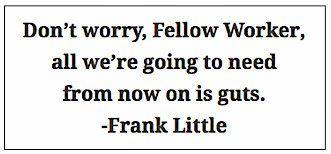 ———–
———–
Hellraisers Journal – Monday June 23, 1919
Kansas County Jails – I. W. W. Members Languish in Hell Holes
From the Kansas City Workers’ World of June 20, 1919:
TO THE READERS OF THE WORKERS’ WORLD
There are now, in three Kansas jails-Topeka, Lawrence and Ottawa-twenty-three members of the Oil Workers’ Industrial Union No. 450, I. W. W. who have been held for nineteen months under indictment in U. S. district court, second Kansas division.
Two indictments have already been returned against these men, but both were flimsy, and the defense attorneys were successful in having both of them quashed; the last one on June 7th in Judge John Pollocks court at Wichita, Kansas. But Fred Robertson, U. S. district attorney succeed in having a third one returned, also on June 7th.
The fact that two indictments were quashed plainly shows that these men are innocent of the charges brought against them; yet the prosecution seems determined to “rail-road” them to prison.
Since these men were jailed three of their number have gone insane and one has died; this as the result of the persecution to which they have been subjected.
These men who, as said, are innocent, yet who have been forced to be in jail for nineteen months, are anxious to secure bail and are taking this opportunity to appeal to all lovers of liberty to come forward and give whatever assistance you can.
 ———-
———-
Hellraisers Journal – Tuesday June 22, 1909
Northwestern Montana – The I. W. W. Band from Eureka, to Kalispell, to Somers
From the Spokane Industrial Worker of June 17, 1909:
The thousands of readers of the Industrial Worker will probably be interested in a few paragraphs relative to I. W. W. brass band that is now on the road doing propaganda work. It was last year that we organized in Portland what was know as the “Overall Brigade,” composed of 20 people who “hoboed” it from Portland, Ore., to Chicago, holding propaganda meetings in nearly every division point between the above mentioned cities.
The great success of those meetings and the receipts of the same was what led to the organization of a brass band for the propaganda work on the road. It was easy to see that if 20 people with no instruments could make their way across the country as the “Overall Brigade” did, that about a dozen, specially selected people in a brass band and bright uniforms would certainly be a howling success. Such it has been for the first week on the road.
It took nearly three months to get the people, instruments, tents, trunks, etc, together. There is an investment of about $800 in the outfit, all of which is owned by the “bunch.” Our first meeting was Eureka, Mont., in the lumber strike district. The head “sprag” of the thieving lumber corporation was there and he was so opposed to the teachings of the I. W. W. and so enraged by the sight of a working class in red revolutionary uniforms, that he bought a couple cases of eggs and proceeded to get company suckers and kids to throw them at the speakers. However, they were caught in the nick of time. The lumberjacks were across the street, a few big fists were thrust into the air and the corporation tools took a sneak.
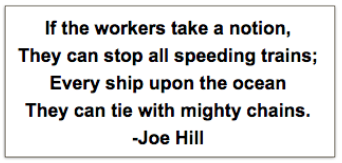 ———-
———-
Hellraisers Journal – Saturday June 21, 1919
Winnipeg, Manitoba – News from the General Strike
From The Butte Daily Bulletin of June 18, 1919:
—–
(Special United Press Wire.)
Winnipeg, June 18.-As a result of the sensational raid made here by federal officials, 10 labor leaders are prisoners and are being held incommunicado in Stony Mountain penitentiary, with the northwest mounted police guarding the labor temple. No person is permitted within 100 yards of the building. Warrants were issued for four others.
Military intelligence officers and other government officers have been planning the raid for a week, but had deferred action until the government could supply the powerful weapon desired in the drastic deportation act. Under this law all aliens and “British-born trouble makers” can be deported.
Charge Inciting Police Force.
The arrests were based on warrants charging “inciting the police force to neglect of duty” and responsibility for publication in the strike bulletin last Wednesday of a special article containing “false and libelous statements.” The story was headed, “Police Replaced by Thugs,” and vigorously attacked the special constables. Civic authorities were assailed for dismissing the regular police force.
The 10 men in prison are Aldermen John Queen and A. C. Capps [A. A. Heaps], the Rev. William Ivens, George Armstrong, R. [B]. Russell, R. E. Bray, [M.] Charitonoff, Moses Almazoff, Mike Berentozuk [Verenchuck] and A. C. Schoppelreidk [S. Choppelrei].
The police also raided the labor temple, Ukrainian hall and Liberty hall, where a vast quantity of literature was seized. The utmost secrecy surrounded the plans for the arrests. Every man arrested submitted quietly on being shown the official warrant.
Of the four men for whom warrants were issued, Sam Blumenberg is reported to have crossed the border into the United States. W. A. Pritchard, a prominent Vancouver labor leader, is said to be on his way to the Pacific coast; R. J. Johns, local labor leader, is in Montreal, and B. Devyatkin, a Russian, cannot be located.